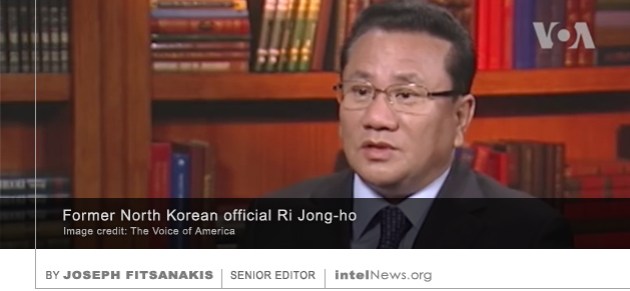North Korea secretly imports Russian oil through Singapore, says defector
June 29, 2017 2 Comments
 The government of North Korea uses intermediary firms in Singapore to import thousands of tons of Russian oil each year, according to a senior North Korean defector who has spoken publicly for the first time since his defection. Ri Jong-ho was a senior official in the Democratic People’s Republic of Korea under its previous leader, the late Kim Jong-il. He rose through the ranks of the Workers’ Party of Korea and was directly mentored by Kim, who personally appointed him to a post in Bureau 39. The powerful body is in charge of securing much-needed foreign currency for Pyongyang —often through illegal activities— and partly funds the personal accounts of the ruling Kim dynasty.
The government of North Korea uses intermediary firms in Singapore to import thousands of tons of Russian oil each year, according to a senior North Korean defector who has spoken publicly for the first time since his defection. Ri Jong-ho was a senior official in the Democratic People’s Republic of Korea under its previous leader, the late Kim Jong-il. He rose through the ranks of the Workers’ Party of Korea and was directly mentored by Kim, who personally appointed him to a post in Bureau 39. The powerful body is in charge of securing much-needed foreign currency for Pyongyang —often through illegal activities— and partly funds the personal accounts of the ruling Kim dynasty.
From the mid-1990s until his 2014 defection, Ri spent nearly three decades in senior positions inside the DPRK. These included the chairmanship of the board of the Korea Kumgang Group, a state-managed firm that oversees large-scale economic activity in North Korea, such as constructing energy networks and commissioning oil and natural-gas exploration. Between 1998 and 2004, Ri lived in the Chinese city of Dalian, where he headed the local branch of the Korea Daesong Trading Corporation. The Pyongyang-based company facilitates North Korea’s exports to China in exchange for Chinese goods and products.
But Ri’s mentor, Kim Jong-il, died in 2011. His son and successor, Kim Jong-un, engaged in a brutal campaign to remove his father’s advisers and replace them with his own people. During that time, said Ri, thousands of senior and mid-level officials were purged, some physically. Frightened and disillusioned, Ri defected with his family to South Korea in October 2014; fifteen months later, in March 2016, he arrived in the United States. On Tuesday, the Voice of America published Ri’s first public interview since his defection.
Among other things, the former Bureau 39 official said that the North Korean regime sustains itself with the help of oil it imports from nearby countries. One of the regime’s main sources of energy is Russia, which supplies Pyongyang with between 200,000 and 300,000 tons of oil every year. But the trade does not occur directly, said Ri. Moscow sells the oil to energy-trading companies in Singapore. These mediators then sell the oil to the DPRK through separately agreed contracts, so that Russia does not appear to be providing Pyongyang with desperately needed oil. The so-called “Singapore line” was established by North Korea in the 1990s, said Ri, and appears to still be active. In addition to Russian oil, the DPRK imports approximately 500,000 tons of oil per year from China, through pipelines, according to Ri.
► Author: Joseph Fitsanakis | Date: 29 June 2017 | Permalink







Can someone please explain why Russia would try to mask its relationship with DPRK? I didn’t think it was a secret that they supported the regime in some form or fashion, and I can’t see what reprecussions there would be for having that relationship public (PRC openly exports oil to DPRK so what’s the difference?).
@Briana: Thanks for your question. The issue is not so much about Russia, as it is about North Korea. Due to international sanctions imposed on it, the DPRK (which produces no oil of its own) is allowed to import just enough oil to keep its essential industries going, and not enough to sustain its military. However, despite international sanctions, the DPRK appears to be able to sustain both its essential industries and its military. Observers speculate that Pyongyang has become very good over the years in importing oil in secret, from companies in countries like Singapore, Malaysia, etc. The question is, does Russia (and China, which some observers say is also supplying the DPRK with oil in secret, in addition to legal exports) know that this is happening? I hope this helps answer your question. [JF]